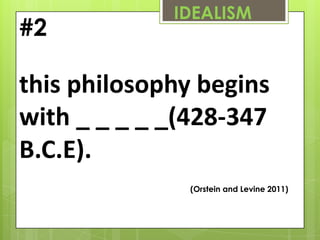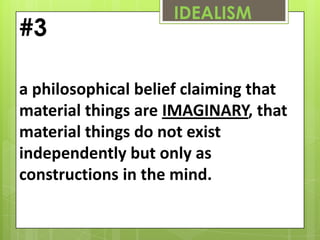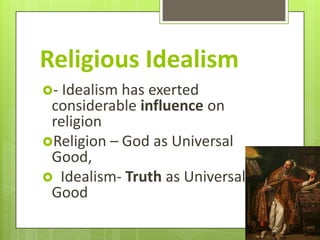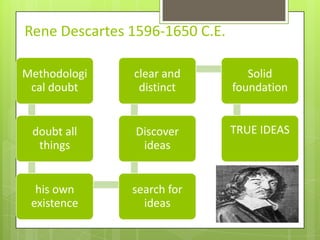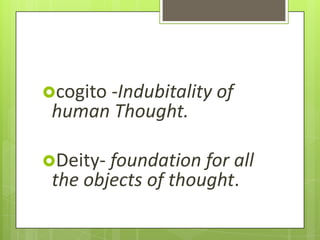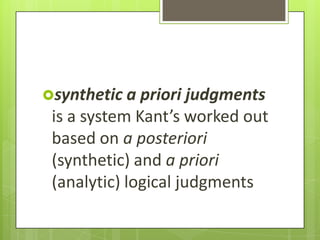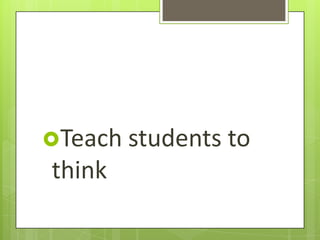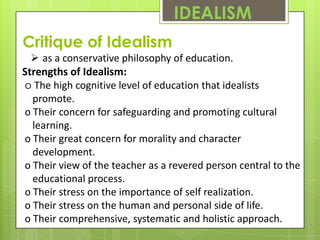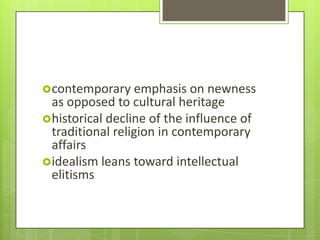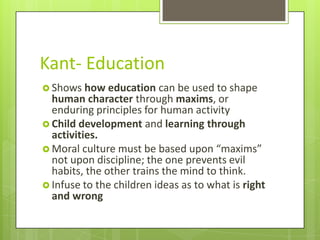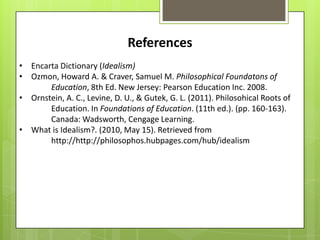Idealism
- 1. Idealism Prepared by: Cariza Arguta & Pia Catalan
- 2. I. The Meaning of Idealism
- 3. IDEALISM #1 is the oldest systematic _ _ _ _ _ _ _ _ _ _ in Western culture. (Ozmon and Craver 2008)
- 4. IDEALISM #1 is the oldest systematic PHILOSOPHY in Western culture, which is a believe that ideas are the only true reality. (Ozmon and Craver 2008)
- 5. IDEALISM #2 this philosophy begins with _ _ _ _ _(428-347 B.C.E). (Orstein and Levine 2011)
- 6. IDEALISM #2 this philosophy begins with PLATO (428-347 B.C.E). (Orstein and Levine 2011)
- 7. IDEALISM #3 a philosophical belief claiming that material things are _ _ _ _ _ _ _ _ _, that material things do not exist independently but only as constructions in the mind.
- 8. IDEALISM #3 a philosophical belief claiming that material things are IMAGINARY, that material things do not exist independently but only as constructions in the mind.
- 9. IDEALISM II. Movements in Philosophy Relevant in Education (Ozmon and Craver 2008) a.Development of Idealism b. Idealism as a Philosophy of Education c. Critique of Idealism d. Two Proponents and their works/ideas
- 10. Development of Idealism • Platonic Idealism (Plato 427-347 B.C.E) • “people should concern themselves in searching for truth” • importance and use of dialectic (or critical discussion) • two worlds: world of ideas (forms) and world of matter (ever-changing) • People do not create knowledge, but rather they discover it. (Doctrine of Reminiscence and in Meno)
- 11. Religious Idealism - Idealism hasexerted considerable influence on religion Religion – God as Universal Good, Idealism- Truth as Universal Good
- 12. Augustine 354-430 C.E Concept of Good: God Concept of Evil :Adam
- 13. Two worlds Man(matter)-Bad God(ideas)- Good Meditation and faith
- 14. Augustine believed that the senses were unreliable and that belief in God rests ultimately on faith. “We must first believe, In order that we may know.”
- 15. He believed that God already created knowledge, and people can discover it through trying to find God.
- 17. Learning must come from within and all true knowledge comes from God.
- 18. Modern Idealism
- 19. Rene Descartes 1596-1650 C.E. Methodologi clear and Solid cal doubt distinct foundation doubt all Discover TRUE IDEAS things ideas his own search for existence ideas
- 20. Cogito, ergo sum, “I think, therefore I am.” Cogito-reaffirms the centrality of mind in the relation of the human being to the world
- 21. cogito -Indubitality of human Thought. Deity- foundation for all the objects of thought.
- 22. George Berkeley (1685-1753 C.E.) all existence depends on some mind to know it; if no minds exist, then for all intents and purposes nothing exists unless it is perceived by the mind of God. Philosophical realism- that material world exists independent of mind.
- 23. Esse Est Percipi (To be is to perceived)
- 24. His mainpurpose is to make evident the existence of God and to prove that God is the true cause of all things.
- 25. Immanuel Kant (1724-1804 C.E.) Critique of Pure Reason Critique of Practical Reason
- 26. Rationalism and Empiricism Rationalism sought universal truths or ideas by which a coherent system structure of knowledge could be deduced. Empiricism (practical and connected with everyday life.)
- 27. Rationalist analytically thinks (a priori) Empiricist synthetically thinks (posteriori) Validity and reliability of modern science Compability of science development in two philo. view
- 28. synthetic a priori judgments is a system Kant’s worked out based on a posteriori (synthetic) and a priori (analytic) logical judgments
- 29. to Kant, the essence of education should not be simply training; the important thing was enlightenment, or teaching a child to think according to principles as opposed to mere random behavior
- 30. Development of Idealism • Modern Idealism Georg Wilhelm Friedrich Hegel (1770-1831 C.E.) • three important books: Phenomenology of Mind, Logic, and Philosophy of Right • Three major aspects of his system: logic, nature and spirit • Spirit is the final stage or synthesis of Idea and Nature. • Hegel’s idealism is most apparent – the search for final Absolute Spirit. • ―to be truly educated, an individual must pass through the various stages of the cultural evolution of humankind. “
- 31. Development of Idealism • Modern Idealism Josiah Royce (1855-1916 C.E.) • the external meaning of a thing depends entirely on its internal meaning — “embodiment of purpose‖ • ―ideas are essentially purposes or plans of action and that the fulfilment of ideas is found when they are put into action― NOTE: • Interests in Idealism continued in several countries.
- 32. Idealism as a Philosophy of Education • Aims of Education • Methods of Education • Curriculum • • Role of the Teacher
- 33. IDEALISM Aims of Education • Search for Truth (highest aim) - philosophical wisdom or the conception of true ideas is the highest aim of education • Self-Realization (ultimate aim) - Idealism has exerted so much influence on educational views about individual mind and self • Character Development (proper aim) - many idealists are concerned with moral character as an outgrowth of thinking and thoughtful actions
- 34. IDEALISM Methods of Education • Dialectic (Plato) • Intuitive approach (Augustine) • Great Books (Modern idealists) • Lecture method • other idealist’s methodology: projects, supplemental activities, library research and artwork. • self-directed activity
- 35. Curriculum
- 37. Idealists think that humans can become more noble and rational by developing the ability to think. Idealists believed that mind, which can conceptualize, create and can accumulate facts, need to be nourished and developed.
- 38. Educational materials ex. Reading materials Teacher should encourage/help students to explore curriculum materials for ideas(life,fam, etc.) Older students- use appropriate materials
- 39. Harris developed a curriculum centered around five studies: mathematics and physics, biology, literature and art, grammar, and history. - Horne suggested seven major studies: physics, biology, psychology, mathemati cs, grammar, literature and history.
- 40. Memorization vs. creativity Art and sciences
- 42. Assist students inchoosing important material Serve as exemplary models Teachers are expected to encourage students to ask questions and to provide a suitable environment for learning.
- 43. Socratic characteristics (analyzing, discussing with others) – encourage their students to better their thinking. Infuses them with a desire to improve their thinking in the deepest possible way.
- 44. IDEALISM Critique of Idealism as a conservative philosophy of education. Strengths of Idealism: o The high cognitive level of education that idealists promote. o Their concern for safeguarding and promoting cultural learning. o Their great concern for morality and character development. o Their view of the teacher as a revered person central to the educational process. o Their stress on the importance of self realization. o Their stress on the human and personal side of life. o Their comprehensive, systematic and holistic approach.
- 46. industrialization and technological advances development in sciences renewed vigor of realism and naturalistic philosophies
- 47. contemporary emphasis on newness as opposed to cultural heritage historical decline of the influence of traditional religion in contemporary affairs idealism leans toward intellectual elitisms
- 48. extreme cognitive and bookish approach idealist curriculum for lacking relevance
- 49. IDEALISM Two Proponents 1) Plato (The Republic) • one of the greatest expressions of idealist philosophy • Plato’s most thorough statement on education • similarities of teaching to think philosophically and a prisoner escaping from a prison • “certain professors of education must be wrong when they say that they can put a knowledge into the soul which was not there before, like sight into blind eyes” • demonstrates painful difficulty toward wisdom and its dangerous consequences.
- 50. Kant- Education Shows how education can be used to shape human character through maxims, or enduring principles for human activity Child development and learning through activities. Moral culture must be based upon “maxims” not upon discipline; the one prevents evil habits, the other trains the mind to think. Infuse to the children ideas as to what is right and wrong
- 51. Features of Character Development 1. Obedience Obedience to his master’s commands. Obedience to what he feels to be good and reasonable will. Voluntary obedience is very important. General rule for all. Duty as a child. Punishment(physical or moral)
- 52. 2. Truthfulness A man who tells lie has no character Negative and positive punishments. 3. Sociableness Form friendships with other children and not be always himself. Friendship to character development
- 53. IDEALISM III. The Philosophies of Education (Ornstein and Levine 2011) a) Key concepts 1. Metaphysics • spiritual, non-material world → ultimately real. • world → the creation of a great universal mind. • concepts of macrocosm( universal mind, the first cause , creator or God) and microcosm(personal mind or spirit) were used 2. Epistemology • Ideas that make up reality have always existed in the mind of the absolute or God. • Plato developed the epistemology of reminiscence.
- 54. IDEALISM III. The Philosophies of Education (Ornstein and Levine 2011) a) Key concepts 3. Axiology • Truth, goodness and beauty exist in a universal and eternal order. • Ethical behaviour reflects the enduring knowledge and values of human culture. 4. Logic • Whole to part relationship between the Absolute and individual minds. • Idealist teachers would use deductive logic to organize lessons. .
- 55. IDEALISM III. The Philosophies of Education (Ornstein and Levine 2011) b) Basic questions • What is knowledge? • What is the school? • How should we teach? .
- 56. IDEALISM III. The Philosophies of Education (Ornstein and Levine 2011) b) Basic questions • What is knowledge? - knowledge is about universal spiritual truths that underlie reality and about the ideas that reflect truth. • What is the school? - it is an intellectual institution where teachers and students pursue the questions, “What is truth? What is beauty? What is good life?” (Socrates &Plato) • How should we teach? - the effective means of teaching and learning process is Socratic method
- 57. IDEALISM III. The Philosophies of Education (Ornstein and Levine 2011) c. Implications for Today’s Classroom Teacher • Idealism seeks to create schools that are intellectual centers of teaching and learning. • It sees teacher as vital agents in guiding students to realize their fullest potential intellectual. • Encourages teachers and the students to encounter and appreciate the finest and most enduring achievement of the culture. • Idealists recognize internet that can make great book accessible to students, however they insist that technology should be used as a means of education and not as an end.
- 58. Thank you for listening!
- 59. References • Encarta Dictionary (Idealism) • Ozmon, Howard A. & Craver, Samuel M. Philosophical Foundatons of Education, 8th Ed. New Jersey: Pearson Education Inc. 2008. • Ornstein, A. C., Levine, D. U., & Gutek, G. L. (2011). Philosohical Roots of Education. In Foundations of Education. (11th ed.). (pp. 160-163). Canada: Wadsworth, Cengage Learning. • What is Idealism?. (2010, May 15). Retrieved from http://http://philosophos.hubpages.com/hub/idealism




